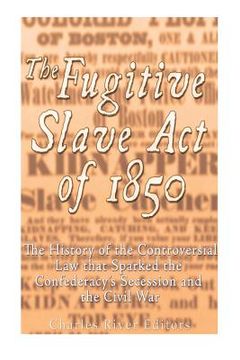The Fugitive Slave Act of 1850: The History of the Controversial Law that Sparked the Confederacy's Secession and the Civil War (en Inglés)
Reseña del libro "The Fugitive Slave Act of 1850: The History of the Controversial Law that Sparked the Confederacy's Secession and the Civil War (en Inglés)"
*Includes pictures *Includes stories about the fugitive slave law and accounts about it *Includes online resources and a bibliography for further reading Despite the attempt to settle America's slavery issue with the Missouri Compromise in 1820, the young nation kept pushing further westward, and with that more territory was acquired. After the Mexican-American War ended in 1848, the sectional crisis was brewing like never before, with California and the newly-acquired Mexican territory now ready to be organized into states. The country was once again left trying to figure out how to do it without offsetting the slave-free state balance that was already dividing the nation. With the new territory acquired in the Mexican-American War, pro and anti-slavery groups were at an impasse. The Whig Party, including a freshman Congressman named Abraham Lincoln, supported the Wilmot Proviso, which would have banned slavery in all territory acquired from Mexico, but the slave states would have none of it. Even after Texas was annexed as a slave state, the enormous new territory would doubtless contain many other new states, and the North hoped to limit slavery as much as possible in the new territories. The Compromise of 1850 was authored by the legendary Whig politician Henry Clay. In addition to admitting California to the Union as a free state to balance with Texas, it allowed Utah and New Mexico to decide the issue of slavery on the basis of what became known as "popular sovereignty", which meant the settlers could vote on whether their state should be a free state or slave state. Though a Whig proposed popular sovereignty in 1850, popular sovereignty as an idea would come to be championed by and associated with Democratic Illinois Senator Stephen Douglas. The Compromise also abolished the slave trade - though not the existence of slavery itself - in Washington, D.C. The Whigs commended the Compromise, thinking it was a moderate, pragmatic proposal that did not decidedly extend the existence of slavery and put slow and steady limits on it. Furthermore, it made the preservation of the Union the top priority. However, even though it added a new free state, many in the North were upset that the Compromise also included a new Fugitive Slave Act, which gave slaveholders increased powers to recapture slaves who had fled to free states by providing that a slave found in a free state could be ordered captured by police or federal marshals and returned to the slaveholder without any trial or due process whatsoever. In addition, no process was provided for the accused escaped slave to prove that he was actually free. This outraged most Northerners, who saw it as an unconstitutional infringement on the rights of their states and the rights of the individual accused of being an escaped slave. It also raised the specter of southern slave owners extending grip over the law enforcement of Northern states. Some states even refused to comply. In Wisconsin, a rioting anti-slavery crowd freed an escaped slave who had been recaptured by federal marshals. When the leader of the riot was imprisoned, the Wisconsin Supreme Court held the Fugitive Slave Act unconstitutional. When the U.S. Supreme Court overturned that decision, the Wisconsin Legislature simply refused to comply with the Fugitive Slave Act or enforce it. Similarly, other Northern states passed laws restricting the ability of federal marshals or bounty hunters to recapture escaped slaves, and they also made it illegal for state officials to help recapture escaped slaves or use state jails for that purpose. . As fate would have it, the refusal of Northern states to strictly apply the new fugitive slave law would be explicitly cited in several of the Southern states' articles of secession in late 1860 and early 1861. In that regard, the Fugitive Slave Act ended up being one of the main tipping points that finally split the nation in two.

